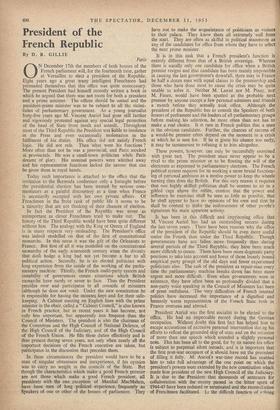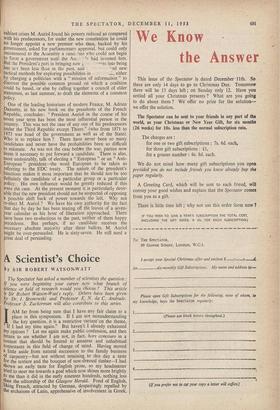President of the French Republic
By D. R. GILLIE
Paris
0 N December 17th the members of both houses of the French parliament will, for the fourteenth time, gather at Versailles to elect a president of the Republic. Eight years ago a great many intelligent Frenchmen had persuaded themselves that this office was quite unnecessary. The present President had himself recently written a book in which he argued that there was not room for both a president and a prime minister. The offices should be united and the president-prime minister was to be subject to all the vicissi- tudes of parliamentary government. As a young journalist forty-five years ago M. Vincent Auriol had gone still further and vigorously protested against any special legal protection of the head of State from insult and assault. Throughout most of the Third Republic the President was liable to insolence in the Press and even occasionally molestation in the fulfilment of his duties.. His office did not satisfy French logic. He did not rule. Then what were his functions ? More often than not he was a provincial, and Paris mocked at provincials. He was a small-town politician while Paris dreamt of glory. His nominal powers were whittled away and his representative functions lacked the savour that can be given them in royal hands.
Today such importance is attached to the office that the invitation to the Bermuda conference only a fortnight before the presidential election has been treated by serious com- mentators as a painful discourtesy at a time when France is necessarily occupied with her own private affairs. Of Frenchmen in the front rank of public life it seems to be a minority that are not thinking of their chances of election.
In fact. the President of the Republic was never as unimportant as clever Frenchmen tried to make out. The history of the Third Republic would have been quite different without him. The analogy with the King or Queen of England is in many respects very misleading. The President's office was indeed modelled on that of the first of constitutional monarchs. In this sense it was the gift of the Orleanists to France. But first of all it was modelled on the constitutional monarchy of the early nineteenth century when the divinity that cloth hedge a king had not yet become a bar to all political action. Secondly, he is an elected politician with long experience from the inside of the working of the parlia- mentary Machine. Thirdly, the French multi-party system and instability of government create situations which British monarchs have rarely or never to face. Thus the President presides over and participates in all councils of ministers (although he does not vote). Under the new constitution he is responsible for having the minutes kept and for their safe- keeping. A Cabinet meeting on English lines with the prime minister in the chair, called a " Cabinet Council," is also known in French practice, but in recent years it has become, not only less important, but apparently less frequent than the Council of Ministers. The president is also the chairman of the Committee and the High Council of National Defence, of the High Council of the Judiciary, and of the High Council of the French Union. He fills these duties effectively and is thus present during seven years, not only when nearly all the important decisions of the French executive are taken, but participates in the discussion that precedes them.
In these circumstances the president would have to be a man of singular obtuseness and inexperience, if his opinion was to carry no weight in the councils of the State. But though the characteristics which make a good French premier are not those which make a good French president, all presidents with the one. exception of Marshal MacMahon, have been men of long political experience, frequently as Speakers of one or other of the houses of parliament. They have not to make the acquaintance of politicians as visitors to their palace. They know them all extremely well from the start. They are often as skilful in political manoeuvre as any of the candidates for office from whom they have to select the next prime minister.
It is in this task that a French president's function is entirely different from that of a British sovereign. Whereas there is usually only one candidate for office when a British premier resigns and that candidate has been mainly responsible in causing the last government's downfall, there may in France be half a dozen men with equal claims to the premiership and those who have done most to cause the crisis may be quite unable to solve it. Neither M. Laniel nor M. Pinay, nor M, Faure, would have been spotted as the probable next premier by anyone except a few personal admirers and friends a month before they actually took office. Although the president of the Republic has to consult the Speakers of both houses of parliament and the leaders of all parliamentary groups before making his selection, he more often than not has to make a real choice. It is rare in French politics that a man is the obvious candidate. Further, the chances of success of a would-be premier often depend on the moment in a crisis at which he is sent for. If he is given his chance too early, it may be tantamount to refusing it to him altogether.
These powers, however, can only be successfully exercised with great tact. The president must never appear to be a rival to the prime minister or to be flouting the will of the electorate as expressed in parliamentary elections. The French political system requires for its working a more brutal function- ing of personal ambition as a motive power to keep the wheels turning than does the British. For this very reason it requires that one highly skilled politician shall be content to sit in a gilded cage above the mêlée, content that the power and influence he exercises shall be seen as little as possible, that he shall appear to have no opinions of his own and that he shall be content to make the endorsement of other people's signatures his main apparent activity.
It has been in this difficult and imprisoning office that M. Vincent Auriol has had an outstanding success during the last 'seven years. There have been reasons why the office of the president of the Republic should be even more useful under the Fourth than under the Third Republic. Though governments have not fallen more frequently than during several periods of the Third Reppblic, they have been much more difficult to create. There have been more dogmatic party positions to take into account and fewer of those loosely bound empirical party groups of the old days and fewer experienced politicians also. The task of the president as repair-man every time the parliamentary machine breaks down has been more urgent and more difficult. Even when governments were in existence, they have often been so profoundly divided that a non-party voice speaking in the Council of Ministers has been of great usefulness. The very difficulties of French internal politics have increased the importance of a dignified and humanly warm representation of the French State both in France overseas and abroad.
President Auriol was the first socialist to be elected to the office. He had an impeccable record during the German occupation. Without doubt this first fact has helped him to escape accusations of excessive personal intervention during his efforts to refloat the grounded ship of state and on the occasion of more than one speech which sounded a slightly personal note. This has been all to the good, for by its nature his office is subject to perpetual silent inroads, and it is important that the first post-war occupant of it should have set the precedent of filling it fully. M. Auriol's war-time record has enabled him to take full advantage of the one point on which the president's powers were extended by the new constitution which made him president of the new High Council of the Judiciary. It is due to the President that thousands of sentences for collaboration with the enemy passed in the bitter spirit of 1944-45 have been reduced or terminated and the reconcil:ation of Frenchmen facilitated. 1.1 the difficult function of sllving cabinet crises M. Auriol found his powers reduced as compared with his predecessors, for under the new constitution he could no longer appoint a new premier who then, backed by his government, asked for parliamentary approval, but could only recommend to the Assembly a cand,,late who could not begin to form a government until the Ass. ' 1v had invested him. But the President's part in bringing new —*Its into being has net been less than in the past, and '-ed new tactical methods for exploring possibilities in . : ,,;„ either by charging a politician with a " mission of information " to discover the possible common ground on which a coalition Could be based, or else by calling together a council of elder statesmen, as last summer, to draft the elements of a common policy.
One of the leading historians of modern France, M. Adrien Dansette, in his new book on the presidents of the French Republic, concludes : " President Auriol in the course of his seven year term has been the most influential person in the country. This was not the case of any one of his predecessors under the Third Republic except Thiers " (who from 1871 to 1873 was head of the government as well as of the State). Who is to replace him '1 There have never been so many candidates and never have the probabilities been so difficult to estimate. As was not the case before the war, parties now deem it necessary to put forward a candidate. There is also, most undesirably, talk of electing a " European " or an " Anti- European " president—the word European to be taken as referring to the EDC treaty. The nature of the president's functions makes it most important that he should not be too definitely the candidate of a particular group or a particular policy. His own influence would be greatly reduced if this Were the case. At the present moment it is particularly desir- able that the new president should not be suspected of opposing a possible shift back of power towards the left. Why not re-elect M. Auriol ? We have his own authority for the fact that day by day he has been tearing off the leaves of a seven- Year calendar as his hour of liberation approached. There have been two re-elections in the past, neither of them happy precedents. But perhaps, if no candidate receives the necessary absolute majority after three ballots, M. Auriol alight be over-persuaded. He is sixty-seven. He will need a great deal of persuading.



































 Previous page
Previous page